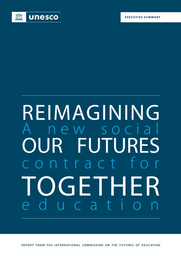In this blog post, we attempt to summarise the key points from the 2021 UNESCO report Reimagining our Futures Together: A New Social Contract for Education. The report explores the ever-changing dynamics of education and the critical need for a new social contract to shape the future of learning. The lengthy report addresses a myriad of facets, offering insights into, and challenges for, the future of education. It encompassing equity, innovative pedagogies, the role of educators, the design of schools, and the potential for international cooperation.
Below is a summarized version of each chapter, highlighting key points:
Chapter 1: “Towards More Equitable Futures”
This chapter:
- Analyses global education trends over the past few decades, highlighting the progress made, and disparities still present, regarding access to education.
- Emphasizes the critical importance of achieving gender equality.
- Addresses inequities in access and quality, challenges in ensuring educational completion, and the need for technical and vocational education.
- Explores the impact of factors such as poverty, wealth inequality, gender discrimination, disability, and conflict.
- Calls for urgent action to address existing inequalities and create a more equitable global education landscape.
Chapter 2: “Disruptions and Emerging Transformations”
This chapter:
- Focuses on anticipated changes in education by 2050 in the context of environmental challenges, digital revolution, biotechnology, and the future of work.
- Emphasizes the importance of addressing climate change through education and the need for digital literacy and access.
- Calls for recognition of both the negative and positive aspects of digitalization.
- Highlights the importance of human-centred policies for the future of work.
- Stresses how uncertain employment futures requires education to adapt.
Chapter 3: “Pedagogies of Cooperation and Solidarity”
This chapter:
- Advocates for a new social contract for education that promotes cooperation and solidarity.
- Calls for pedagogies that promote trust and respect among students and teachers.
- Encourages problem-oriented, interdisciplinary, and collaborative pedagogical approaches.
- Emphasizes the need for pedagogies that support alternative ways of knowing, feeling, and living.
- Highlights the importance of safe and imaginative learning environments.
Chapter 4: “Curricula and the Evolving Knowledge Commons”
This chapter:
- Advocates for curricula that promote ecological, intercultural, and interdisciplinary learning.
- Emphasizes the importance of integrating social and emotional learning into curricula.
- Calls for future literacy, plurilingualism, and culturally responsive numeracy education.
- Highlights the role of humanistic disciplines, digital skills, arts education, and human rights education.
- Promotes gender equality in curricula and the role of higher education.
Chapter 5: “The Transformative Work of Teachers”
This chapter:
- Highlights the critical role of teachers in reshaping the future of education.
- Calls for revaluing and reimagining the teaching profession and viewing teaching as a collaborative endeavour.
- Emphasizes the importance of teacher autonomy, preparation, and collaboration.
- Positions teachers as central figures in the transformative journey of education.
Chapter 6: “Safeguarding and Transforming Schools”
This chapter:
- Emphasizes the role of schools in promoting inclusion, equity, and well-being.
- Calls for the transformation of schools to be more flexible, diverse, and supportive of intergenerational learning.
- Highlights the importance of physical and social presence in schools alongside digital tools.
- Advocates for the development of cultures of collaboration and professional development within schools.
Chapter 7: “Education Across Lifespans and Life Spaces”
This chapter:
- Emphasizes the need to broaden the concept of when and where education takes place.
- Calls for diverse educational models for different age groups, including early childhood education and adult education.
- Highlights the role of states in ensuring the right to education and the changing dynamics of human life.
- Advocates for digital tools in promoting the right to information and culture.
Chapter 8: “Research and Innovation”
This chapter:
- Highlights the critical role of research and innovation in a new social contract for education.
- Calls for a collaborative worldwide research agenda rooted in the right to education.
- Emphasizes the importance of ethical considerations in research and innovation.
- Encourages universities, research institutions, and international organizations to play a central role.
Chapter 9: “Global Solidarity and International Cooperation”
This chapter:
- Advocates for renewed commitment to cooperation among state and non-state actors at various levels.
- Emphasizes the role of education as a common good in shaping a prosperous, just, sustainable, and peaceful world.
- Calls for universal digital access to knowledge and information.
- Focuses on the role of UNESCO in convening and mobilizing global institutions.
- Calls for international collaboration to address future educational needs and challenges.
The report outlines paths for a more equitable, inclusive, and innovative educational ecosystem. It highlights the importance of new pedagogies that promote cooperation and solidarity, the vital role of teachers as transformative figures, and the imperative to safeguard and transform our schools into inclusive learning environments. The idea of education transcending formal institutions and extending across diverse age groups and life spaces emphasises the importance of lifelong learning. Moreover, the report underscores the significance of research, innovation, and global solidarity in shaping the future of education. Given the massive changes currently taking place, it provides an aspirational direction for our collective endeavour as educators.
